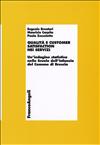Statistics for the social enterprise of quality (by Maurizio Carpita, Elena Poli). Objectives The present study firstly proposes to extend the standard total quality approach, to take into account the peculiarities of the social enterprises, as the non profit organiza- tions offering social utility services are called in Italy since 2006 (DL n. 155/2006). Furthermore, the study aims at evaluating the characteristics of the quality systems in the certified social enterprises, in order to obtain a picture of the actual quality systems developed in the social service sector. Methods and Results The theoretical model proposed is called Social Relationship Value Management (SRVM) and is developed starting from the analogous model proposed in the for profit literature (Payne et al., 2001). The theoretical investigation, also concerning the statistical instruments to evaluate quality, is completed by a online survey involving the quality responsible of the certified social enterprises belonging to the CGM network. In this context, the SRVM approach can be developed by the linkage research techniques, using appropriate statistical indicators and models. The results of the survey clearly show that (i) the quality is considered as an internal instrument of organization and management rather than as an instrument useful to strengthen the relationships with the stakeholders and (ii) the weakness of the quality system is mainly due to the lack of recognition and interest from the external subjects. Conclusions The SRVM model can be adopted to develop effective quality systems in the social enterprises and can be supported by using appropriate statistical techniques. In our opinion, the proposed model can help to face and partly solve the problems pointed out by the survey.




